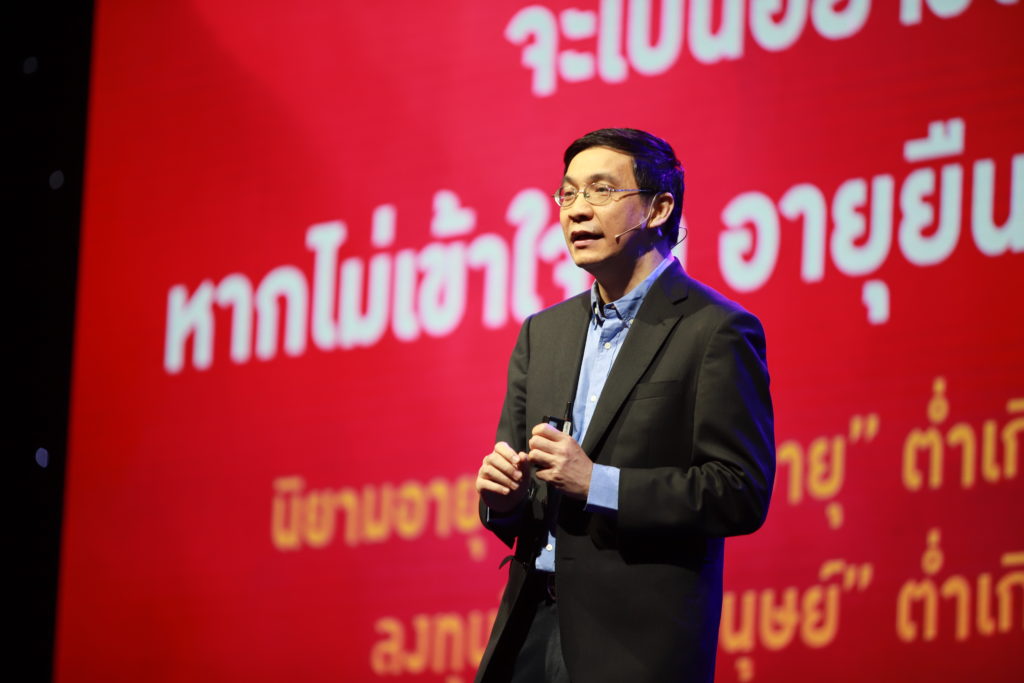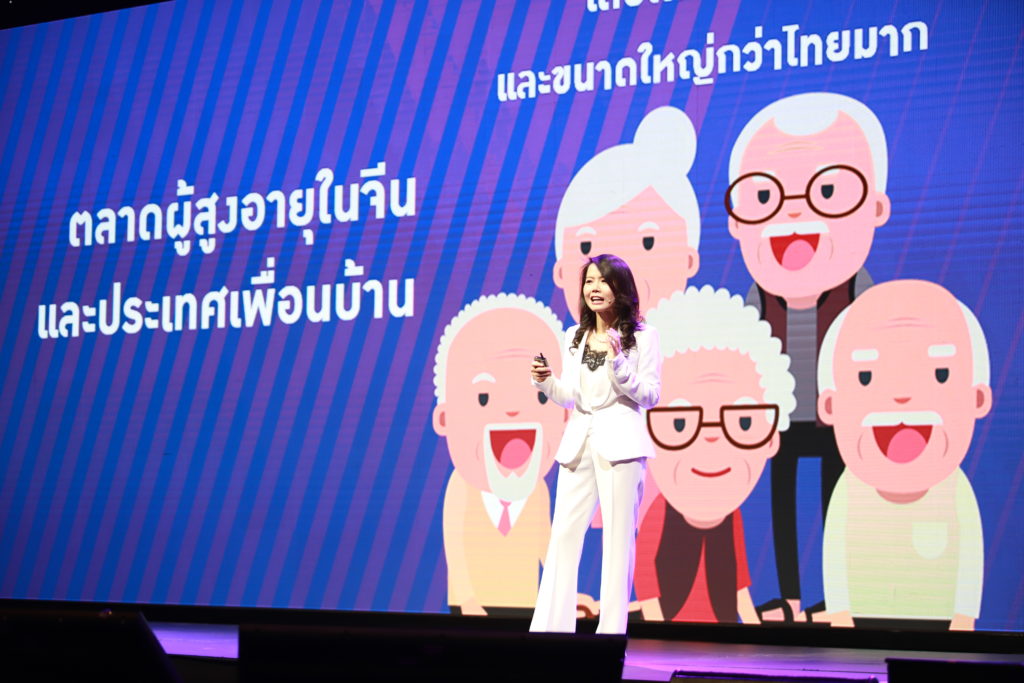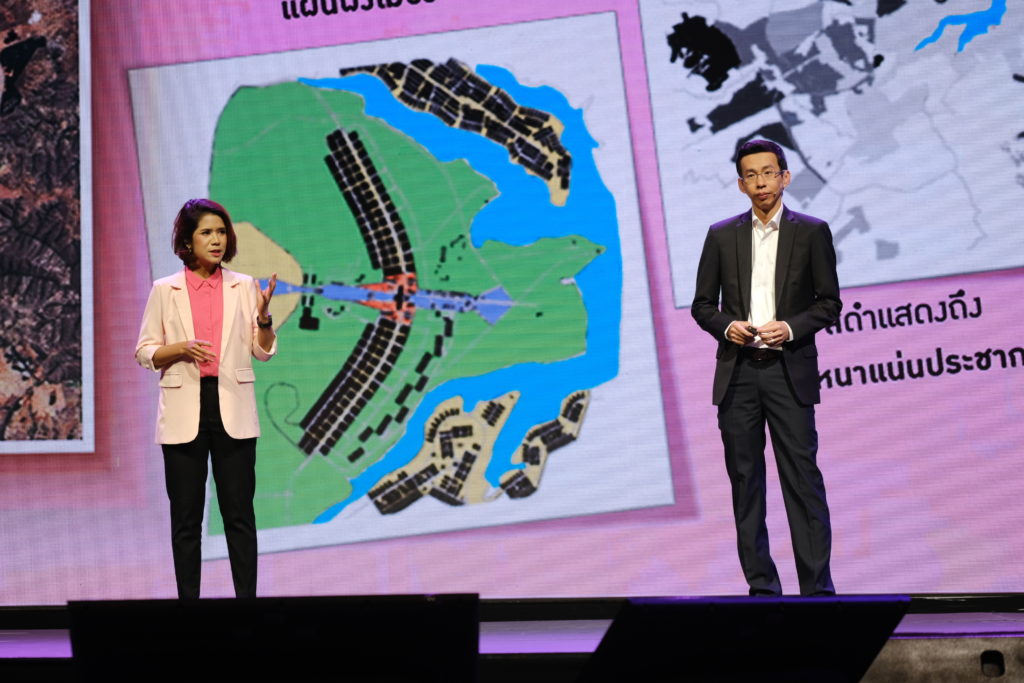TDRI urges Thailand to adopt policies for longevity society before it is too late
Extend retirement age. Support labour-saving technology. Promote active ageing. Help workers learn new skills. Set up old-age insurance system. And reduce the number of conscripts to ease labour shortage.
Thailand needs to implement these measures to sustain economic growth as the country ages, urges Thailand Development Research Institute (TDRI), Thailand’s independent think tank.
If not, Thailand’s economic growth risks dropping by 0.8% per year.
“We’re now living in a society where people live and stay productive much longer than ever before. We need new policies to use their skills and experiences when the number of young people is diminishing,” said Dr Somkiat Tangkitvanich, TDRI president.
Being a longevity society does not necessarily slow down the country’s economic growth if Thailand adopts right policies, said Dr Somkiat during the TDRI annual public conference “Longevity Society: Making Thailand Competitive, Healthy, and Secure” at the Centara Grand & Bangkok Convention Centre at CentralWorld on May 13, 2019.
To sustain productivity, the business sector needs to adopt new recruitment policy to hire the older workforce, make the workplace safe for older workers, and use more automation, robotics, software, and artificial intelligence to tackle labour shortage.
Meanwhile, people need to save early to ensure financial security in old age. They also need to learn new skills so they can work and maintain self-esteem after official retirement age.
“The state authorities, the business sector, and all of us need to prepare and act now to tackle the challenges in longevity society,” said Dr Somkiat.
Apart from keeping older people in the workforce, a team of TDRI researchers stressed the need for state policies to promote active ageing. They include accessible and safe city infrastructure and public transport systems, more public green space, health insurance system for the elderly, and measures to help workers learn new skills before and after retirement due to rapid technological changes.
How to make it happen?
First understand the new reality and see its potential, said Dr Somkiat Tangkitvanich.
Older but healthier
Thanks to better healthcare, Thais live 4.4 years more each year during the past six decades, he said. At present, Thailand’ average life expectancy is 75 years. Given the constantly improving health technology, people born in 2016 are expected to live until 80-98 years on an average, if technology progress is taken into consideration.

Centenarians is no longer a rarity. In 2017, Thailand already had more than 9,000 centenarians according to a National Statistical Office’s survey, he said.
“People not only live much longer, they are also much healthier,” added Dr Somkiat. “Age has become a state of mind, not how many years we have lived.”
Older people nowadays are also more educated and have more work experiences than previous generations. More of them live alone and tend to pursue personal interests outside their communities. Their houses need readjustment for old age safety while their health problems mainly stem from non-communicable diseases such as diabetes and high blood pressure due to lifestyle behaviours.
This new reality also brings new business opportunities. Increasing retirement age to 65 would enable active and healthy older people to contribute to the economy.
Not understanding the challenges will entail many policy mistakes, said Dr Somkiat. The current retirement age remains too low. Valuable human resources will be wasted. At present, Thailand is already losing people in the 50-60 age group due to early retirement policy, he added.
In addition, the government will fail to invest in human resources and city infrastructures to prepare for longevity society. And without good health and enough savings, a long life won’t mean more happiness but more difficulties in old age, he said.
“We need to understand that preparations for the longevity society does not benefit only the elderly, but all of us,” said Dr Somkiat. “We will live much longer so we need policies to make the economy grow and prepare us to cope with the challenges.”
According to TDRI research, retaining workers in the 50-60 age group and reskill them will soften economic slowdown by 9%. Bringing workers in the 60-69 age group back to workforce will improve the situation by 2%. Increasing the 100,000 migrant workers per year helps about 3%. Reducing the number of conscripts from the current level of 100,000 per year will further help.
To sustain growth more effectively, either increasing investment in automation by 1.1-1.6% above the normal trend (around 40 billion baht in 2018) or increasing the total factor productivity by 1.1% through innovations and new businesses will neutralise the slower economic growth from labour shortage.
A longevity society also demands inclusive and more accessible city infrastructure and health services. While early savings and learning new skills are necessary for financial security in old age, investing in good health early in life as well as sustaining a network of friends for an active social life in old age are also important, he added.
When the number of housebound and bedridden older persons will be higher than one million in two decades, the government needs to give more support to health and care services for the old-old elderly.
The social security system also needs revamp to prevent it from collapsing when pensions exceed contributions from the active workforce, he cautioned.
According to Dr Somkiat, the longevity society demands new allocation of resources for healthcare, pension security, lifelong educational services, and unemployment protection.
Thailand needs a more open political system which allows representatives across age groups to have a say in policymaking to avoid conflicts between the young who want change and the old guards who want to protect the status quo, he said.
The representation was highly skewed for the appointed National Legislative Assembly, whose average age of members was 63. The youngest is 54 and the oldest is 94. The average age of the recently elected district members of parliament is lower at 52. The elected MPs are also more representative in terms of age, with the age of the youngest at 27 and the oldest at 83.
Sustaining economic growth
Despite a shrinking workforce, Thailand can still sustain economic growth to support its ageing society. To do so, Thailand should invest more in automation and robotics in the manufacturing, agricultural, and service sectors, said TDRI senior research fellow Dr. Saowaruj Rattanakhamfu.

In Thailand, automation and robotics are concentrated in the manufacturing sector, especially the automotive industry. However the overall use of industrial robots is still at 45 per 10,000 workers in Thailand, which is below the average of 74 in Asia, and of 85 in the world, she said.
Moreover, more than half of Thai factories are still in the “Industry 2.0” phase, characterized by mass production and assembly lines powered by labor and electricity. Although Thailand is aiming to become “Thailand 4.0”, only 2% of Thai factories use automation and data exchange systems, which are fundamental to the “Industry 4.0”.
The agricultural and services sectors should also use more automation and robotics. Since Thai farmers are on average older than 50, adopting automation and robotics in agriculture can effectively tackle labour shortages and increase productivity. It will also significantly ease environmental problems, she added.
For example, the use of cane harvesting machines will reduce the problems of labour shortages and cane burning. One machine with only 6 workers can cut 250-300 tonnes of cane a day. This would require 167-200 laborers working manually to cut the same amount of cane.
“The environment will also be better from reducing toxic haze from farm burning,” said Dr. Saowaruj.
Investing in automation and robotics in the agro-food industry also brings quick returns, enhances productivity, and increases production capability to meet increasing demand. Using robotic arms to lift heavy objects and automatic chicken cutting machines are examples which reap the benefits from automation and robotics, she added.
Similarly, the use of software and AI in the services sector speeds up work several times with higher accuracy. For instance, medical doctors can use AI to help diagnose heart disease effectively. Companies can also use robotic process automation (RPA) software for repetitive office works.
Creating new growth engines is still necessary, however, to sustain economic growth in a longevity society. As Thailand enters an aging society earlier than other ASEAN countries except Singapore, Thailand should take the first-mover advantage by starting to produce goods and services to meet the demands of local elderly people. It should then tap the huge market demands from a growing number of senior citizens in ASEAN as well as China, urged the senior research fellow.
The potential for exporting to neighboring countries is promising. By 2029 there will be 13 million citizens over 65 in Thailand, while there will be nearly 70 million in ASEAN, and almost 240 million in China.
Dr Saowaruj argued that a longevity society would create at least 20 promising sectors to serve senior citizens and other age groups. For senior citizens: medical tourism, home care for the elderly, tourism and education for the elderly, home renovation and smart homes, reverse mortgages for senior citizens, robot caregivers, and biosimilar medicines. For other age groups: anti-ageing products and services, wellness services, smart health devices, fertility clinics, learning for kids, pet products, food supplements, and healthy food. In addition, for businesses, system integration (SI) services for automation and robotics is also promising.
For businesses catered to the seniors to be successful, it is necessary to involve senior citizens in product and service development because they best understand their peers’ needs, urged Dr. Saowaruj.
To support sustainable growth with a longevity society, the government should encourage SMEs and farmers to use automation and robotics by providing a subsidy for consultancy costs and tax incentive or low-interest credit to invest in automation, robotic, and software technologies, she proposed.
In addition, to support longevity-related businesses, the government should build an ecosystem to support a more conducive business environment by producing the much-needed personnel in shortage areas (such as healthcare, caregiving, and automation system), protecting consumers especially seniors from scams, frauds and exploitation, speeding up the registration process for regulated products such as medicine and skincare products, and ultimately supporting R&D and innovation.
“Whether Thailand is able to compete and sustainably grow with a longevity society is not about destiny, but how we deal with it”, summarized Dr.Saowaruj.
Cities for active ageing
With growing urbanisation, the majority of older persons will be living in cities. City development must, therefore, be supportive of active and healthy ageing, said Dr. Sumet Ongkittikul, research director for transport and logistics policy, TDRI.
Older persons can still contribute to the economy when cities are designed to help them exercise, participate in social activities with ease, and live an active life safely.
Therefore, cities should be walkable, have enough green space, and provide easily accessible and safe public transportation systems which benefit all age groups, not only the older persons.
According to Dr. Sumet and Ms Nichamon Thongphat, a TDRI researcher, Bangkok is still unfriendly to people in longevity society.
For starters, hospitals are concentrated in inner city. The heavy traffic during rush hours becomes life-threatening for people needing emergency care.

Meanwhile, only one-fourth of the residents live within the 1.5 km radius of public parks. Unable to walk to the nearest public park explains why 43% of older people prefer to go to malls and department stores rather than parks. Only 8% of the elderly said they go to parks.
Bangkok is also not safe for walking. According to the international walkability scores, Bangkok only gets 18 out of 40 marks. The footpaths are often too narrow, ridden with walking obstacles, and invaded by motorcyclists, making walking a dangerous venture. Many roads do not even have footpaths at all, said Dr Sumet.
The mass transit system is largely inaccessible to senior citizens and people on wheelchairs. Only 59% of the urban train stations have elevators and wheelchair ramps. Often, the elevators do not function while the ramps are located in tight corners which make them inaccessible.
Taking buses is not easy either for older persons. Low-floor buses make up only 30% of the whole bus system. Moreover, most bus stops still do not accommodate the parking of low-floor buses.
Understandably, older persons prefer to use motorcycle. That choice often turns deadly. Of all the casualties from road accidents, 61% of the elderly victims are motorcycle drivers or passengers.
According to Dr. Niramon Serisakul, director of Urban Design and Development Center (UddC), there are many idle spaces in Bangkok that can be turned into public parks. Most of them belong to different state agencies.
The lack of interagency coordination, however, makes it difficult to turn these idle areas into public green space or to make footpaths walkable and safe.
Apart from increasing green space and making public transportation systems easily accessible, Dr. Niramon stressed the importance of people participation to make cities livable and safe. She also proposed covered walkways and more urban greenery to encourage people to walk more.
Old age financial security
Without sufficient state welfare assistance, the majority of people in longevity society have to depend on their own savings for financial security and health care services in old age, says Assoc. Prof. Dr. Worawan Chandoevwit from the Faculty of Economics, Khon Kaen University, and Thailand Development Research Institute (TDRI).
The future looks grim as the majority of older people do not have enough savings.
It will be difficult for them to receive family support as extended family is on the decline and the number of nuclear families and people living alone is on the rise.

According to her research, extended families have dropped from three decades ago from 80% to only 49% at present. In the same period, nuclear families have increased from 7% to 20% and the one-person household from only 6.5% to 21%.
At present, about 35% of parents receive financial support from their children. Parents in the near future most likely won’t have this opportunity as the number of children per household has dropped from 1.4 to 0.5.
Those without little income and savings will definitely struggle in old age. According to her research, an older person in urban areas need at least 7,000 baht for basic necessities which is higher than their social security pension and elderly allowances combined.
According to the National Statistical Office of Thailand, only 11% of older people have more than one million baht of savings. With a monthly expense of 7,000 baht, this one million baht savings will last for only 10 years. To live until 100 from the age of 60, they need at least 4 million baht of savings.
Meanwhile, the monthly expense for 5% richest persons with urban lifestyle is 19,000 baht. They need to have at least 11 million baht savings when they are 60 to live until 100. If they live in the countryside with lower expense of 12,000 baht per month, they still need to have at least 7 million baht of savings. All figures are in 2019 prices.
With insufficient or no savings at all, the situation will be extremely difficult when they reach their 80s and 90s when many of them will be housebound and bedridden with no one to look after them. This will be the problems of elderly women in particular because they live longer than their husbands while care responsibilities usually fall on their daughters.
By 2027, there will be at least 200,000 bedridden and 300,000 housebound elderly in Thailand. Twenty years from now, the bedridden and housebound elderly will rise to over one million.
As of now, it takes 120,000 baht per year to care for housebound old people while it takes 230,000 baht for the bedridden.
There is then an urgent need for mandatory and voluntary saving schemes as well as health insurance for the bedridden and housebound elderly to lessen their financial burden of care services, urged Dr. Worawan Chandoevwit.
According to a joint project between Dr. Worawan and Dr. Nada Wasi from the Puey Ungphakorn Institute for Economic Research, Bank of Thailand, the majority of people express interest to buy a long-term care insurance. . But the amount of premiums they are willing to pay and types of care services they need vary
Lifelong learning
Living in the longevity society means longer years of work life amid rapid technological changes. Everyone must then be flexible and open to learning new skills, said Ms. Nicha Pittayapongsakorn, TDRI researcher on education reform.

The government and the business sector should support employees to equip themselves with timely skills, she urged. Many governments in other countries are doing this by setting up “individual learning accounts” for their citizens and helping them plan for their career through innovative career guidance platform.
In Thailand, the Non-Formal Education Department and the Department of Skill Development should work with local administrations, non-profit organizations and local universities to better respond to the reskilling demand of the Thai workforce, she urged.
As hiring older workers will soon become mainstream, the business sector needs to make the workplace friendly to older people which include improving the ergonomics and workplace safety which also benefit other workers, she said.
To support, the government should fine-tune existing tax incentives to companies which hire older persons to attract more beneficiaries. To expand the talent pool in longevity society, a law against age discrimination may also be necessary.
Work keeps the older people active and mentally healthy because it increases self-esteem and keep them away from depression, she added.
“Our society is at a crossroads. Living a long life can be both a blessing and curse depending our quality of life in old age,” she said. “We must then ask ourselves now how we can live a healthy long life. We must also ask the business sector to change and push for government policies that serves longevity society.
“If we fail, living too long will be curse. But if we succeed, living a long, healthy life will be our blessings.”
